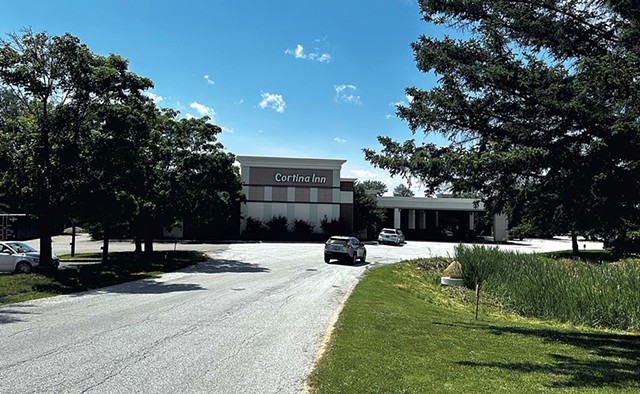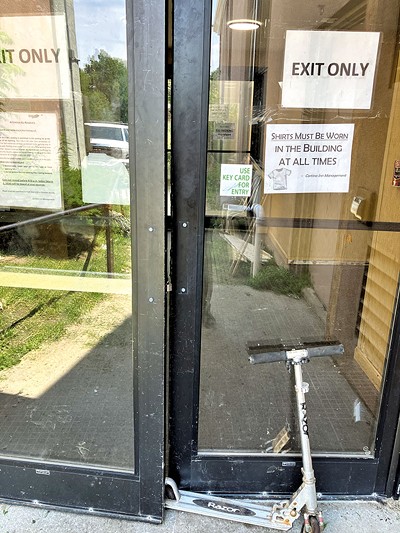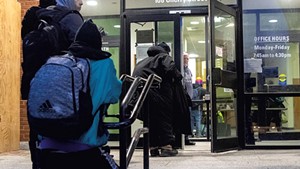
- Alison Novak ©️ Seven Days
- Cortina Inn
The Cortina Inn, one of 76 hotels and motels sheltering homeless people in Vermont, is not complying with provisions of an agreement with the Town of Rutland that are intended to keep residents safe. A hotel staff member is on the sex offender registry, a violation of the November 2023 terms. Exterior doors don't have alarms and have been left propped open, also violations.
Front office manager Shaun Bryer's status on the offender registry is broadly known among residents and town officials, some of whom have vouched for his character and helpfulness. State officials, including some at the Department for Children and Families, which oversees the hotel program, also know. A judge has allowed him to work there.
It's unclear what power the town has to enforce the agreement. Selectboard members said they are pursuing legal advice.
The situation raises questions about oversight of the controversial and costly General Assistance Emergency Housing Program, which expanded during the pandemic. The state is slowly winding down the program for the unhoused, which has cost more than $215 million over the past several years. But state officials and the Cortina's co-owner, Dhruv Kumar, have acknowledged that the hotel will likely be used to house homeless people for the foreseeable future.
"We're trying to do what we can to help these folks," selectboard chair Mary Ashcroft told Seven Days, "and we're baffled as to why the state authorities aren't working to protect them."
The Cortina, located just off Route 7, once served as a popular community gathering spot and conference center. The former Holiday Inn hosted travelers, retirement parties, wedding receptions and rotary club meetings. In recent years, the 150-room hotel has put up hundreds of adults and children with no place else to go.
A recent tour revealed a property that has seen better days. Rundown RVs and cars on cinder blocks sat outside, and kids' bikes and toys were scattered about. Inside, a security guard with the overdose-reversal medication Narcan strapped to his belt walked through the building. Wallpaper was peeling, floors and carpets were dirty, and a foul odor pervaded the stairwell. A torn notice hanging on a hallway door said children under 16 must be accompanied by an adult from 8 p.m. to 6 a.m. and asked pet owners to clean up dog poop.
About 200 people, 54 of them children, live in the Cortina at a nightly rate of $80 per room, according to state data. Of around 1,300 households eligible for the housing program statewide, almost 360 are staying in the Rutland area.
Rep. Eric Maguire (R-Rutland City) works for Rutland Dismas House, which provides transitional housing for people released from prison. He raised concerns about the program during an April floor speech at the Statehouse.
"Babies are growing up in hotel rooms; children are being exposed to drugs, human trafficking and violence. People are dying in these hotel rooms. There are no kitchens; there is no living space," he said in the speech. "We are concentrating our most vulnerable, impoverished and disabled people in buildings not designed for permanent habitation."
The impact on the 4,000-person town — which encircles the more populous city of Rutland — has been substantial, officials say. Police calls to the south end of town, where the Cortina is located, increased from around 150 in 2019 to more than 1,400 last year, according to Rutland Town Police Chief Ed Dumas, who has just two other officers. A drug raid at the hotel in February led to the arrest of a woman for selling cocaine, and Dumas said he has responded to multiple drug overdoses at the hotel. The hotel pays the town $23,000 a month for the demands it places on municipal services, including policing.
If the state is going to pay for people to stay at the Cortina, Dumas said, it should also provide intensive social services such as mental health support. The state is "keeping them from freezing to death, and that's about all they're doing," Dumas said.
John Paul Faignant, the town's health officer, said he's observed unsafe conditions at the Cortina, including black mold on the walls. A sewer backup last year caused raw sewage to flood two rooms — one occupied by a disabled veteran and the other by a man with a cognitive disability. The conditions are so bad, Faignant said, that the Cortina "needs to be bulldozed."
But there's little he can do. Because of a 2022 state policy change, Faignant said, local health officers can no longer enforce regulations at hotels. The state, though, isn't providing adequate oversight, he said.
The Cortina is better than some of the alternatives, said Brenda Siegel, the executive director of End Homelessness Vermont, who praised the hotel for supporting its residents. A former Democratic candidate for governor, Siegel instead faults the state for failing to ensure vulnerable people in Vermont are safely sheltered. The Agency of Human Services, for instance, could have required hotels to enter into lease agreements that include strict health and safety standards, Siegel said, but declined to do so.
She believes things have improved in the months since Kumar began running the hotel last summer. When residents tell management that something needs to be fixed, Siegel said, it's addressed. The Cortina is also compassionate toward people with mental health disabilities, she said, recounting how a staff member regularly reminds a man with schizophrenia that he has a room there.
Yet the hotel isn't abiding by some key provisions in the contract it signed with the town last fall. At a June 18 selectboard meeting, Faignant, the health inspector, told town officials that he had found all three rear exit doors of the hotel propped open that day. The town worries about unauthorized people getting inside, a problem that's plagued the hotel.

- Courtesy Of JP Faignant
- A door propped open at the Cortina Inn
And, most concerningly to some, the Cortina's front office manager, Bryer, is on the sex offender registry. A former teacher and Morristown Selectboard chair, Bryer served 10 years in prison after he was convicted in 2011 of sexually abusing three boys who were students at the school where he worked.
"I don't care how reformed someone is," said Sharon Russell, a member of the Rutland Town Selectboard. "Someone who is a sex offender does not belong at a place like that."
One person who was kicked out of the hotel told Seven Days that she thought it was retaliation after she informed other residents that Bryer is a registered sex offender. Bryer said the eviction had nothing to do with that and his status is widely known by residents.
"I've discussed it openly with them, as well as with service providers, law enforcement and other hotel staff members," said Bryer, who has worked at the hotel since 2021. "It is not a secret."
In his role, Bryer said, he does mostly office work and coordinates other hotel employees' schedules and has limited interactions with residents. The Cortina's policy is that at least two staff members must be present when they enter guest rooms, Bryer noted.
He said his parole officer and DCF officials know where he works and Kumar knows of his status as a sex offender.
"I trust and believe that everyone involved in my situation regarding supervision [and] employment is well aware of what my conditions are and there is no concern about me working in this location," Bryer told Seven Days.
Bryer said he works closely with police and DCF workers in his role as a mandated reporter — someone legally required to report child abuse and neglect to the state. Under Vermont law, anyone who is an "employee, contractor [or] grantee of the Agency of Human Services" and has contact with its clients is a mandated reporter.
When he was released from prison in 2021, Bryer's conditions of parole required the Department of Corrections to approve his place of employment. But in January of this year, Bryer successfully petitioned the court to remove that condition.
At that hearing, Bryer's attorney told a judge that her client worked at a Rutland-area hotel but did not specify that it was part of the emergency housing program or that dozens of children lived there, a recording of the hearing shows. Bryer told the judge that he successfully completed community-based treatment for sex offenders at the Clara Martin Center in Randolph after his release. He also completed a treatment program while incarcerated.
Siegel, the housing advocate, said she has observed Bryer working closely with law enforcement, DCF and other providers across Rutland.
"We have a large number of clients with complex needs at the Cortina," Siegel said, "and he takes critical steps to meet those needs."
Police Chief Dumas said it is common knowledge in town that Bryer is on the sex offender registry. Dumas said Bryer is cooperative, competent and comes across as "a nice guy." However, Dumas said that, as a former investigator of sex crimes, he has "some worries" about a person with Bryer's background working at the Cortina.
Haley Sommer, spokesperson for the Department of Corrections, told Seven Days that her agency's responsibility is to ensure those under supervision are meeting conditions set by the court. Bryer, she said, has been compliant with the terms of his parole. Sommer said DCF had expressed concerns to the DOC about Bryer working at the Cortina last fall because of his status on the registry. Corrections passed along that information to the court, Sommer said.
Ultimately, it's up to the town to decide whether and how to enforce the terms of its agreement with Kumar, a Cortina co-owner. At a May meeting of the Rutland Town Selectboard, Kumar was asked about his employees.
"Criminal background checks for your staff and nobody on the sex offender registry on your staff?" board chair Ashcroft asked Kumar at the meeting.
"Yes," Kumar replied. "Everyone has a valid work permit that was issued by the state. So, everyone that does have one is OK at the moment. We did verify with everyone."
"For both?" Ashcroft asked.
"For both, yes," Kumar said.
Kumar did not respond to several emails from Seven Days seeking clarification about his comments.
When asked by Seven Days about Bryer's status on the sex offender registry, Ashcroft expressed frustration but declined to comment directly on whether the selectboard would take up the issue with Kumar.
"We have a contract with the Cortina ... and it has provisions ... because we thought it was important to put them in for the protection of the children and the vulnerable folks who live there," Ashcroft said. She said she gave a copy of the agreement to a state official in May.
DCF said in a statement that it has no control over who the hotels hire because they are private businesses. A spokesperson also said DCF does not conduct criminal background checks for any of the participants in the program, meaning that guests could include people on the sex offender registry.
Some say the situation highlights the broader shortcomings of the housing program, which they view as a Band-Aid rather than a solution to homelessness.
Russell, the selectboard member, ran the Open Door Mission, a veterans' shelter and soup kitchen in Rutland City, for four decades. She wonders why the state didn't invest in land and tiny homes, rather than "warehousing" people in hotels.
"Make it a village. Make it respectable and give these people something they never had," Russell said. "It's not humane, the way these people are being treated."














Comments
Comments are closed.
From 2014-2020, Seven Days allowed readers to comment on all stories posted on our website. While we've appreciated the suggestions and insights, right now Seven Days is prioritizing our core mission — producing high-quality, responsible local journalism — over moderating online debates between readers.
To criticize, correct or praise our reporting, please send us a letter to the editor or send us a tip. We’ll check it out and report the results.
Online comments may return when we have better tech tools for managing them. Thanks for reading.